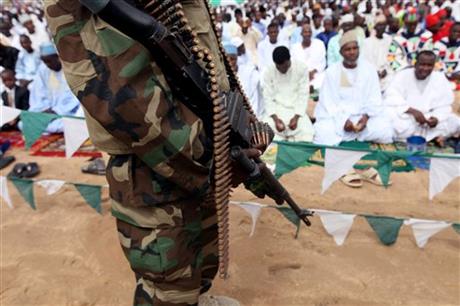MAIDUGURI, Nigeria (AP) — Nigerians in the birthplace of the Islamic uprising gripping the country’s northeast celebrated the start of the Muslim holy festival of Eid al-Fitr with devout prayers and a joyful show of adulation for their king that attracted more than 10,000 people.

Because of the threat of Islamic extremist violence, it was the first big public Eid festival in three years in Maiduguri and the delight that it could take place — amid massive security — was heard in the cries of ululating women, screams of delight from children and men chanting “Long live the king!”
The Shehu of Borno, as the king is known, and his courtiers mounted horses bedecked with beaten silver and maroon pompoms and slowly paraded to the cheers of residents a couple of kilometers (miles) to the palace.
The large turnout was a triumph for the Joint Task Force of soldiers, police and intelligence officers fighting the extremist violence in a 3-month-old state of emergency.
“We want the world to see that despite the security challenges we are happy and joyous,” Tijjani Abba Ali, a civil society leader, told The Associated Press.
However the festivities were marred by gunshots two blocks from the king’s palace that crackled after dignitaries and most security details had departed.
Women grabbed up children and scattered, losing flip-flop sandals in their rush. Soldiers screeched off and an exchange of gunfire ended the outburst 10 minutes later.
“It’s Boko Haram!” said a security guard. The incident passed without major violence, but the fear remained amid the celebrations.
Boko Haram — which means Western education is sacrilege — terrifies residents. The Islamic extremists are blamed for the deaths of more than 1,600 people in the past two years.
The Boko Haram network is accused of large-scale bombings against civilian targets and attacks on Muslim and Christian religious and political leaders as well as Westerners, journalists, Christian churches and primary schools, according to a report issued this week by the International Criminal Court in The Hague. The radicals also have attacked mosques and imams who preach against their extreme brand of Islam.
In one of the cruelest attacks, on a school outside Maiduguri last month, extremists locked pupils into a dormitory and set it ablaze, burning many alive.
The extremists’ violence poses the worst threat in years to unity in Nigeria, Africa’s biggest oil producer and most populous nation of more than 160 million people, almost equally divided between Christian and Muslim. It also raises fears for other countries in the region.
Now some of the people of this area in northern Nigeria are fighting back. A vigilante group of young men and at least one woman brandishing cutlasses, bows and arrows and homemade wooden clubs studded with nails are visible at the many roadblocks throughout the city, capital of Borno state, searching for suspected members of the banned terrorist network.
Buses are ordered to stop and their passengers to alight for body searches.
The vigilantes claim to have handed hundreds of suspects to the military.
“Boko Haram has no mercy, so we have no mercy for them,” said Adamu Usman, an unemployed 30-year-old. He said he joined the vigilantes because Boko Haram has killed several members of his family “for no reason, I cannot say why.”
Soldiers, who praise the vigilantes for helping them, man their own checkpoints.
The Eid celebrations must end at 11 p.m. when a curfew, relaxed from 6 p.m. a month ago, takes hold and a menacing silence settles on the heat-soaked city on the fringes of the Sahara Desert.
People used to gather outdoors late into the night, enjoying the cool air: men drinking small cups of strong mint tea, veiled women relaxing in swept sand patches and children improvising games with homemade toys.
Now, because of the threat of Boko Haram, after dark people lock themselves into rooms heavy with heat, mosquitoes and flies.





